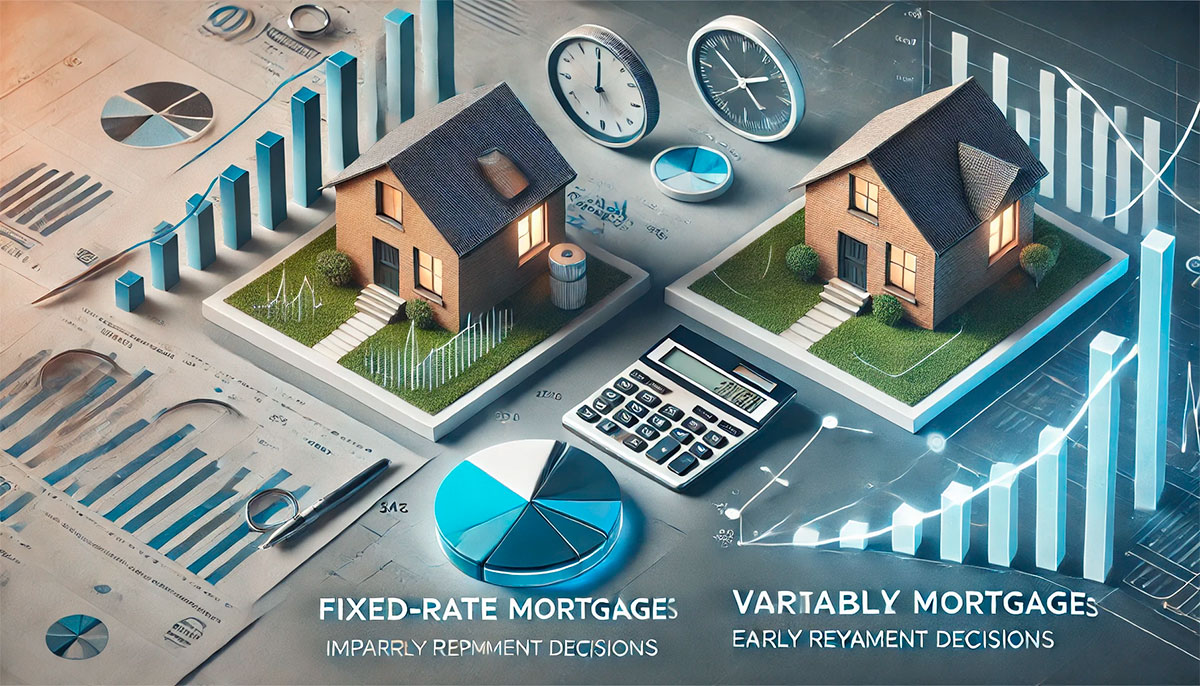One of the key financial decisions that homeowners may face during the life of their mortgage is whether to repay their loan early. Early mortgage repayment can offer several benefits, such as reducing the total interest paid over the life of the loan and allowing homeowners to achieve debt freedom faster. However, the decision to make early repayments is not always straightforward, and banks take several factors into account when deciding whether to allow or facilitate early mortgage repayment. In this article, we will explore the factors influencing bank decisions on early mortgage repayment, the conditions that apply, and the potential benefits and drawbacks for borrowers.
1. Loan Agreement Terms
The first factor that influences a bank’s decision on early mortgage repayment is the specific terms outlined in the loan agreement. Mortgages are often structured with certain clauses that govern how and when early repayments can be made. These terms can vary depending on the type of mortgage and the lender. Some mortgage contracts allow borrowers to make early repayments without penalty, while others may impose fees or limitations on how much can be repaid in a given year.
For example, many fixed-rate mortgages allow borrowers to repay a portion of the loan early each year without penalty, but they may limit this to a specific percentage of the original loan amount (usually around 10%). Once the borrower exceeds this limit, the lender may impose an early repayment charge (ERC) or other fees. It is crucial for borrowers to carefully review the terms of their mortgage agreement to understand whether early repayments are permitted and what, if any, fees apply.
2. Type of Mortgage
The type of mortgage a borrower holds plays a significant role in the bank’s decision-making process regarding early repayment. Different mortgage products have different rules and conditions regarding early repayments. Here are some common mortgage types and how they impact early repayment decisions:
Fixed-Rate Mortgages: Fixed-rate mortgages typically have more structured repayment terms, and early repayment is often subject to penalties or restrictions. If the borrower wishes to pay off the loan faster than the agreed schedule, the lender may charge an early repayment fee, especially if the borrower tries to pay off a large portion of the loan. However, some lenders may offer flexible options where borrowers can make small additional repayments without incurring penalties.
Variable-Rate Mortgages: With variable-rate mortgages, the interest rate may fluctuate, and the terms for early repayment can be more flexible. Some variable-rate mortgage lenders may allow borrowers to make overpayments or settle the loan early without penalty. However, this depends on the specific terms and conditions, and borrowers should verify with the lender whether early repayment is allowed under these types of loans.
Interest-Only Mortgages: For borrowers with interest-only mortgages, the situation is different. These loans require only interest payments during the initial term, with the principal due at the end of the loan. Early repayment of the principal can be allowed, but banks may assess the borrower’s financial situation more thoroughly, as this type of mortgage is typically considered higher risk. Borrowers may be subject to additional scrutiny to ensure they can handle the larger repayment amounts.

3. Prepayment Penalties
One of the most significant factors influencing a bank’s decision on early mortgage repayment is whether the mortgage agreement includes prepayment penalties. Prepayment penalties are fees that lenders charge if the borrower repays the mortgage in full or makes significant repayments before the end of the loan term. These penalties are designed to protect the lender’s interest, as they typically lose out on the long-term interest income if the loan is paid off early.
The structure of prepayment penalties can vary widely. Some penalties are a flat fee, while others are calculated as a percentage of the loan balance or the remaining interest. Lenders may also impose a penalty if the borrower exceeds a certain percentage of the original loan amount in early repayments. However, many modern mortgage agreements now offer “penalty-free” options, especially with fixed-rate loans, where borrowers can repay a portion of the loan early without incurring additional charges.
4. Lender’s Profitability and Business Model
Another factor influencing a bank’s decision on early mortgage repayment is the lender’s overall profitability and business model. Banks rely on interest payments from mortgages as a steady revenue stream, so they may be less inclined to allow early repayment, especially if it results in a loss of interest income. For lenders who are more focused on long-term relationships with borrowers, they may offer flexible repayment terms to accommodate borrowers who wish to pay off their loan early.
For some banks, particularly those focused on home loans as a core part of their business, early repayments may be discouraged or subject to penalties to maintain steady cash flow. However, other financial institutions may encourage early repayment if it aligns with their business model, such as banks offering lower fees for early repayment to attract customers who prioritize reducing their debt burden.

5. Borrower’s Financial Situation
The borrower’s financial situation is another crucial factor that banks take into account when considering early mortgage repayments. Banks assess the borrower’s ability to repay the loan early based on their financial stability, including income, assets, and existing debt levels. If a borrower is experiencing financial difficulties, the bank may allow for early repayment as a way to reduce the borrower’s debt burden. In such cases, the lender may work with the borrower to find a mutually agreeable solution, including deferring the early repayment penalty or structuring a more manageable repayment plan.
On the other hand, if a borrower has recently experienced financial windfalls, such as a large bonus, inheritance, or sale of an asset, the bank may be more inclined to accommodate the early repayment request. Lenders are generally more flexible with borrowers who demonstrate financial responsibility and a solid track record of timely payments.
6. Interest Rate Environment
The broader interest rate environment also influences a bank’s decision regarding early mortgage repayments. In periods of low-interest rates, banks may be more inclined to accept early repayments as they are not relying as heavily on mortgage interest for profit. Conversely, during periods of high-interest rates, banks may discourage early repayment to protect their revenue streams. The financial strategy of the bank and how it aligns with the current market conditions may play a role in the bank’s willingness to accept early repayment.
7. Customer Relationship and Retention
Finally, banks may consider the value of maintaining a long-term relationship with the borrower. Some lenders may be more lenient on early repayments as part of a customer retention strategy. If the bank believes that accommodating early repayments will encourage the borrower to stay loyal or take out additional products in the future, they may waive penalties or allow for flexible repayment terms. In this case, the bank is prioritizing customer satisfaction and long-term business over short-term revenue from interest payments.
Early mortgage repayment is a decision that can benefit both borrowers and lenders under the right conditions. However, banks assess several factors when deciding whether to allow or facilitate early repayment, including the loan agreement terms, the type of mortgage, prepayment penalties, the lender’s profitability, the borrower’s financial situation, and the broader interest rate environment. While some banks may impose penalties or restrictions on early repayment, others may offer more flexibility, especially if it aligns with their business model or customer relationship strategy. For borrowers, understanding these factors can help them make informed decisions about paying off their mortgage early and ensuring that they are getting the best deal possible from their lender.



